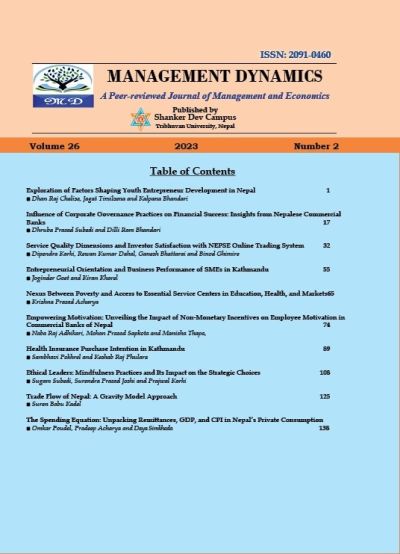Exploration of Factors Shaping Youth Entrepreneur Development in Nepal
DOI:
https://doi.org/10.3126/md.v26i2.72285Keywords:
Access to finance, Education training, Innovativeness, Perceived social norms, Youth entrepreneurship developmentAbstract
The study aimed to evaluate the current state of youth entrepreneurship development in Nepal and investigate the relationship between various factors such as education training, entrepreneurial skills, access to finance, unemployment, perceived social norms, entrepreneurial motivation, and innovativeness with youth entrepreneurship development. Utilizing a quantitative research design, data was collected from a sample of 200 individuals actively engaged or aspiring in youth entrepreneurship in Nepal, employing a random sampling technique. Through Five-point Likert scale questionnaire, Descriptive Statistics, Correlation Analysis, Regression Analysis, and Reliability Test were utilized to analyze the data and explore the relationships and extent of impact among the variables. The findings indicate significant positive correlations between all pairs of variables examined, suggesting strong relationships between education training, entrepreneurial skills, access to finance, unemployment, perceived social norms, entrepreneurial motivation, innovativeness, and youth entrepreneurship development. Furthermore, the regression analysis revealed that education training, perceived social norms, and entrepreneurial motivation have statistically significant positive effects on youth entrepreneurship development, with innovativeness showing the strongest positive influence. However, entrepreneurial skills, access to finance, and unemployment did not significantly impact youth entrepreneurship development in Nepal. The study provides valuable insights for policymakers, educators, and stakeholders aiming to enhance the youth entrepreneurship ecosystem in Nepal.
Downloads
Downloads
Published
How to Cite
Issue
Section
License
Copyright © Research Management Cell, Shanker Dev Campus

